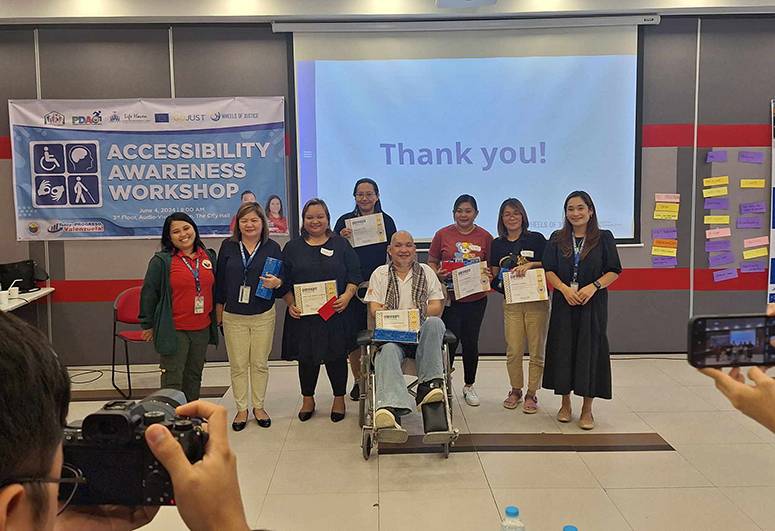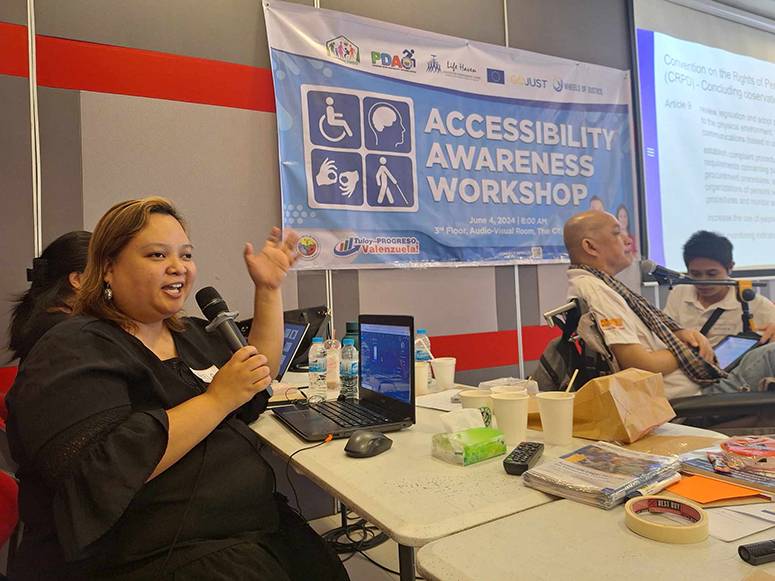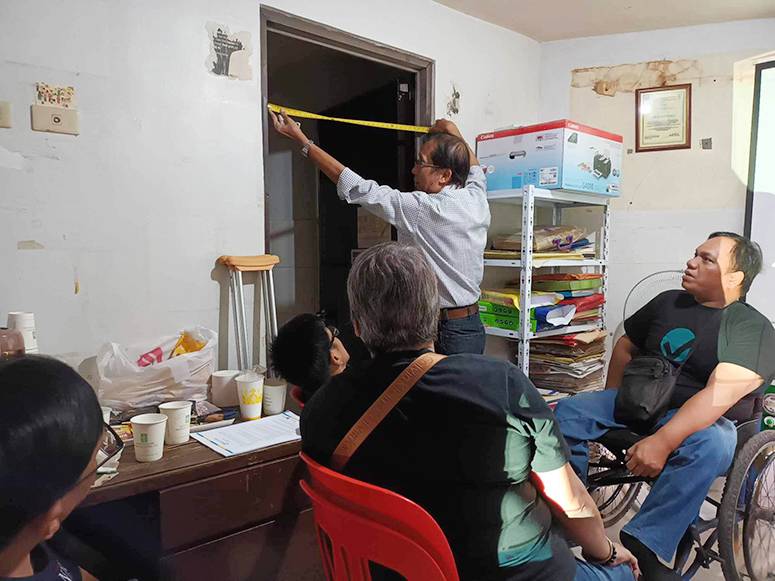Project Wheels of Justice believes in an equitable society where the law is accessible to all
In a society that lacks inclusivity, the pursuit of equity for persons with disabilities faces hurdles that urgently need to be addressed. Project Wheels of Justice under Life Haven Center for Independent Living stands at the forefront of this movement.
With a grant of EUR 19 million (P1.1 billion) spanning over four years, the initiative is funded by the European Union’s GOJUST programme which strives to improve access to justice for every Filipino. Bolstering inclusive and sustainable socio-economic development, GOJUST collaborates with the Philippine Supreme Court, the Department of Justice, and the Department of the Interior and Local Government to develop more responsive and accountable justice services.
Through a grants facility, the Programme works with universities and civil society organizations to improve access to justice for women, LGBTQ+, indigenous communities, and other disproportionately affected groups. GOJUST also seeks to strengthen the Commission on Human Rights in fulfilling its constitutional mandate to protect and promote human rights in the Philippines, with co-funding from the Spanish Agency for Development Cooperation (AECID), totaling EUR 1 million (P59.47 million).

Project Wheels of Justice was born from a desire to properly enforce the Batas Pambansa Blg. 344 (BP344), otherwise known as the Accessibility Law. While the law was enacted in the 1980s, it had seen minimal implementation. This motivated the Life Haven team to seize the funding opportunity offered by the GOJUST programme in 2022. After a rigorous half-year application process, the initiative was officially launched in Valenzuela City.
A multi-faceted approach
Project Wheels of Justice provides support for persons with disabilities through practical assistance, counseling, and a paralegal program, alongside community awareness, accessibility initiatives, and policy advocacy. It employs a three-pronged approach to ensure comprehensive and holistic action is undertaken towards its mission.

Firstly, its Awareness and Empowerment pillar focuses on strengthening confidence among persons with disabilities and educating them about their legal rights. This is done through capacity-building sessions, workshops, and educational materials. For instance, the project organizes in-person workshops and online webinars for persons with disabilities and local government officials in Valenzuela City to empower both persons with disabilities and the wider community in navigating and advocating for inclusivity.
Second, the project tackles Compliance and Collaboration by partnering with various stakeholders like businesses, institutions, and government bodies. The project conducts accessibility audits for establishments and collaborates with local government units to promote compliance and ensure adherence to accessibility laws. Notable partnerships include those with the National Council on Disability Affairs and the Commission on Human Rights.

Lastly, it handles Prosecution when accessibility laws are violated. The project offers support from paralegals, financial aid, and guidance through legal processes. This ensures that its clients can pursue justice effectively.
Driven by empathy and morality
Project Wheels of Justice’s vision is rooted in the belief that empowering persons with disabilities is essential for progress. With team members undertaking a diverse roster of roles such as project leadership, research and development, legal assistance, accessibility auditing, community engagement, and stakeholder coordination, the project operates a small yet dedicated team primarily based in Valenzuela City. A typical day in the organization involves a hybrid working model, with some team members stationed in the office while others conduct fieldwork.
While the project spreads its impact through various initiatives like accessibility audits, action-driven partnerships, and educational workshops, it measures its success by the difference it makes in one person’s life. One notable success story involves a client who dealt with unpaid loans. After enduring years of avoidance by their borrower and enduring ridicule within their community due to the borrower spreading malicious rumors, the client was able to restore their funds with the assistance of Project Wheels of Justice. Although their primary focus is on Accessibility Law violations, the team hopes to expand the project to accommodate other legal cases such as these.
Project Wheels of Justice’s vision is rooted in the belief that empowering persons with disabilities is essential for progress.
The team is deeply rooted in the conviction to fight for what’s right through the lens of inclusivity. Cases involving the abuse and bullying of children with disabilities have highlighted the urgent need for broader legal support, while women face differentiated impacts with regard to their Sexual and Reproductive Health and Rights (SRHR). Furthermore, some of the most common violations of BP344 include the lack of or inadequate ramps, inaccessible entrances, non-compliant restrooms, insufficient signages, inaccessible public transportation methods, and obstructed walkways and pathways, all of which are common to see in the Philippines if one pauses to observe their surroundings.
Through Project Wheels of Justice, the team calls for both persons with or without disabilities to actively join them in calling out infractions of the Accessibility Law. Some ways to support the project include volunteering, spreading awareness, and reporting accessibility violations. By joining forces, the project believes in a more inclusive environment where everyone, regardless of sector in society, can thrive.
Steering the wheels of justice forward
The project envisions Valenzuela City to be a model city in the Philippines for inclusivity and accessibility. While its short-term goals include conducting training sessions on the rights of persons with disabilities, producing accessibility audit videos, and spreading more awareness of their services through social media, its long-term goal is to enact an ordinance to strengthen the Accessibility Law’s implementation. If the project gains enough traction, it is also hoped that its services can be replicated and extended to other nearby municipalities and even up to cities nationwide.
With its holistic approach to promoting accessible legal services for persons with disabilities, Project Wheels of Justice not only empowers individuals disproportionately affected by a broken system, but also fosters a wider community where inclusivity is seen as a fundamental human right and not a mere privilege.


